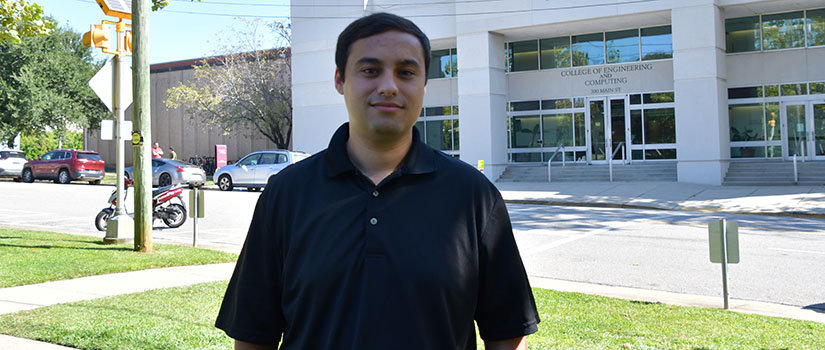Mechanical engineering Ph.D. candidate Jarrett Peskar was recently awarded a $2,000 travel scholarship by the Office of Naval Research (ONR) to present his work on electrothermal battery modeling at the 244th Electrochemical Society Meeting. Attended by top researchers in electrochemistry from across the world, the event will be held from October 8-12 in Gothenburg, Sweden.
Peskar earned his undergraduate degree in mechanical engineering from the University of South Carolina before transitioning directly to the Ph.D. program. He is currently a graduate assistant for Associate Professor Austin Downey’s research group, which is studying the implementation and control of lithium-ion batteries in naval systems. Principal investigators for the project are electrical engineering professors Roger Dougal and Enrico Santi.
Last summer, Peskar worked on similar research for a naval internship in Philadelphia. When ONR announced the scholarship opportunity, Downey encouraged him to apply.
“Jarrett’s path from undergraduate through graduate school demonstrates the college-wide efforts to build large teams focusing on industry problems,” Downey says. “He works on a Navy-funded project, interned with the Navy’s research ecosystem over the summer, and now his work has been recognized by the Navy through this award to fund his travel to Sweden to present his research.”
Peskar’s research involves simulating and emulating lithium-ion batteries. He builds models that replicate how batteries react when a load or voltage is applied. Peskar is also measuring heat generated by the batteries to determine the degree to which they can be used without overheating.
The battery models will be used as a tool for naval and aviation systems to indicate the smallest battery that is needed for operating the systems to ensure heat is controlled while satisfying the power requirement.
“The Navy has to ensure they can control the heat from the batteries before implementing them. This can prevent a battery from exploding on an aircraft or aboard a ship. The models serve as a generic tool to emulate batteries for any system being measured,” Peskar says.
While Peskar didn’t begin his Ph.D. studies with an interest in batteries, his work has helped underscore the value of research in this area. “Lithium-ion batteries are still pretty new for most industries,” he says. “There is a lot more that we can do with them as the field advances, so any research in this area is pretty important.”
Peskar is scheduled to complete his degree in late 2025. At that time, he hopes to continue working with the U.S. Department of Defense performing civilian research for a branch of the U.S. military.
